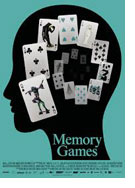

Opening 3 Oct 2019
Directed by:
Janet Tobias, Claus Wehlisch
Writing credits:
Janet Tobias, Claus Wehlisch
There are various memory-enhancing games for toddlers through and into adulthood. None though, can compete with the memory games and competitions that include a world championship. Writer-directors’ Janet Tobias and Claus Wehlisch focus on four memory athletes: mononymously Yanjaa, Mongolian, Nelson Dellis, American, and Johannes Mallow and Simon Reinhard, German. Each explains what compelled them to study the memory palace technique, a method to enhance memory using spatial memory, i.e. familiar objects and information, adapted from ancient Greeks and Romans. Trailing their development, we learn what associations and tricks each uses and how/why it works for them, what drives them, and side issues of concern. Yanjaa’s humor seeps through, as does Simon’s seriousness, while physical conditions are Nelson and Johannes’ concernment.
The CG illustrations are extremely clever, and brilliantly executed. Production values are solid, even though Claus Wehlisch’s editing choices are not discerning enough. Salient points are raised but not explored, e.g., Yanjaa’s mention of competition organizers’ talk about “beauty contests” for female competitors. Three-time world memory champion Alex Mullen, American, and memory grandmaster, Andy Fong, Hong Kong are skimmed over.
Still, Memory Games perspicacity, information, and its mesmerizing illustrations make this documentary well worth seeing. The memory champions are of the same mind about how having a healthy body and mind is important, and that memory makes life meaningful. Memory is, after all, to be human – “It’s everything, isn’t it.” (Marinell Haegelin)
The Memory Games documentary film shows the development of four gifted young people of different nationalities (Germany, Sweden, USA and Mongolia) who win international memory championships.
One of the young people is wheelchair-bound and can finally be admired and respected worldwide using his extraordinary memory. The Mongolian-born and raised-in-Sweden young woman perfects the use of her memory and extravagant personality. Another, impressed by his grandmother’s memory degeneration, begins to use and develop his memory in the hope of not being affected by the disease. The other young man searches through laboratory research to know how his brain works during the different executions and problems in competitions.
Their association with images, numbers, and stories allied to the generality of having a privileged and unusual memory make them world champions in the memory discipline. Janet Tobias’ documentary did not present any surprise, since the theme is much explored today. (Geysa Wiemann)